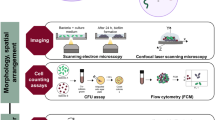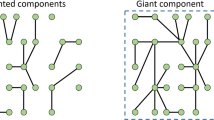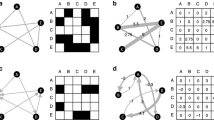Abstract.
Biological and social systems have been found to possess a non-trivial underlying network structure of interacting components. An important current question concerns the nature of the evolutionary processes that have led to the observed structural patterns dynamically. By comparing the metabolic networks of evolutionarily closeby as well distant species, we present results on the evolution of these networks over short as well as long time scales. We observe that the amount of change in the reaction set of a metabolite across different species is proportional to the degree of the metabolite, thus providing empirical evidence for a `proportionate change' mechanism. We find that this evolutionary process is characterized by a power law with a universal exponent that is independent of the pair of species compared.
Similar content being viewed by others
References
H. Jeong, B. Tombor, R. Albert, Z.N. Oltvai, A.-L. Barabasi, Nature (London) 407, 651 (2000)
A. Wagner, D.A. Fell, Proc. R. Soc. Lond. B 268, 1803 (2001)
A.-L. Barabasi, Z.N. Oltvai, Nature Rev. Genetics 5, 101 (2004)
A.-L. Barabasi, R. Albert, Science 286, 509 (1999)
B.A. Huberman, L.A. Adamic, Nature (London) 401, 131 (1999)
B. Kahng, Y. Park, H. Jeong, Phys. Rev. E 66, 046107 (2002)
M. Kanehisa, S. Goto, Nuc. Acids Res. 28, 27 (2000)
H. Ma, A.-P. Zeng, Bioinformatics 19, 270 (2003); http://genome.gbf.de/bioinformatics/publications.html
S. Schmidt, S. Sunyaev, P. Bork, T. Dandekar, Trends in Biochemical Sciences 28, 336 (2003)
R.V. Sole, R. Pastor-Satorras, E. Smith, T.B. Kepler, Adv. Complex Syst. 5, 43 (2002)
A. Vazquez, A. Flammini, A. Maritan, A. Vespignani, Com. Plex. Us. 1, 38 (2003)
H. Jeong, Z. Neda, A.-L. Barabasi, Europhys. Lett. 61, 567 (2003)
J. Kim, P.L. Krapivsky, B. Kahng, S. Redner, Phys. Rev. E 66, 055101 (2002)
F. Chung, L. Lu, T. Gregory-Dewey, D.J. Galas, J. Comput. Biol. 10, 677 (2003)
E. Eisenberg, E.Y. Levanon, Phys. Rev. Lett. 91, 13870 (2003)1
S. Wuchty, Z.N. Oltvai, A.-L. Barabasi, Nature Genetics 35, 176 (2003)
J.M. Cork, M.D. Purugganan, BioEssays 26, 479 (2004)
R. Guimera, L.A.N. Amaral, Nature (London) 433, 895 (2005)
L.H. Caporale, Annu. Rev. Microbiol. 57, 467 (2003)
R. Tanaka, Phys. Rev. Lett. 94, 168101 (2005)
L. Li, D. Anderson, R. Tanaka, J.C. Doyle, W. Willinger, e print arXiv:cond-mat/0501169
Author information
Authors and Affiliations
Corresponding author
Rights and permissions
About this article
Cite this article
Singh, S., Samal, A., Giri, V. et al. A universal power law and proportionate change process characterize the evolution of metabolic networks. Eur. Phys. J. B 57, 75–80 (2007). https://doi.org/10.1140/epjb/e2007-00145-0
Received:
Published:
Issue Date:
DOI: https://doi.org/10.1140/epjb/e2007-00145-0




